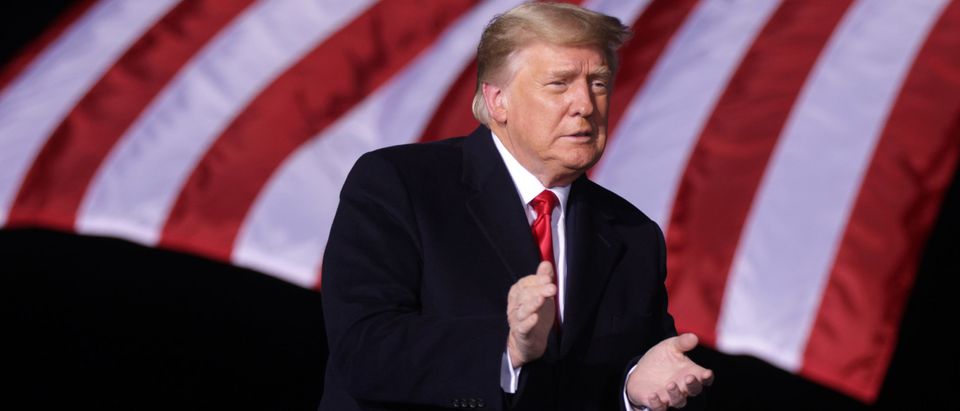Editor’s note: We endeavor to bring you the top voices on current events representing a range of perspectives. Below is a column arguing that social media companies should not be allowed to ban Trump. You can read a counterpoint here, where Adrian Moore, vice president at Reason Foundation, and Rebecca van Burken, a policy analyst at Reason Foundation, argue that social media companies, as private entities, have the right to ban whomever they choose.
Imagine explaining to a pro-life activist that abortion is currently legal in the United States. Silly, right? The pro-life movement is not deluded; it does not argue that Roe vs. Wade is not currently good law. The pro-life movement seeks to change the law: that’s the point.
Yet when Big Tech censorship comes up, libertarian tech policy types never tire of pointing out that the First Amendment, broadly speaking, does not constrain private actors. But that’s the beginning of the debate, not the end. For conservatives, the question is whether we should pass new laws that protect Americans from the menace of Facebook and Twitter’s censorship.
Granted, there is a natural conservative/libertarian instinct that says private companies *ought* be able to do whatever they want. But that ethical notion is not an absolute, and as a factual matter, it’s been rejected in American law for over 130 years.
WHAT IS
The Interstate Commerce Act of 1887 was the first major federal statute that regulated common carriers: railroads. Early railroads often had natural monopolies in areas where only their track was laid, and prior to the statute’s passing, they would discriminate against passengers and smaller shippers. Both parties found this state of affairs wanting. The 1887 Act was passed with broad bipartisan support.
That was followed by the Mann-Elkins Act of 1910, which imposed common carrier status on telephone and telegraph companies, and the Communications Act of 1934, which created the Federal Communications Commission. The FCC today regulates radio, television, wire, satellite and cable communication throughout the United States; it is in the business of telling private companies what they can and cannot do.
And of course, let’s not forget the Civil Rights Act of 1964, which destroyed a collective regime of mass private discrimination: Jim Crow. That statute came out of the basic ethical proposition that private businesses should not, in fact, be free to do whatever they want; they should not be allowed to discriminate on the basis of race.
Thus, the question of whether private businesses have unfettered discretion to deny service to their customers has been settled for quite a long time in this country. They don’t. Under current law, yes, social media companies have more freedom to discriminate than other communications companies.
Perhaps they shouldn’t.
WHAT OUGHT TO BE
As a policy matter, the social media censorship debate contains elements of both the common carrier debate and various civil rights debates.
Americans use Facebook and Twitter to connect with their friends, to understand what’s happening in the world and as a kind of extended photo album/diary. In that sense, denying Americans’ access to Facebook is akin to denying them access to a landline telephone. Yes, Americans in 2021 don’t have to use Facebook to communicate – and Americans in 1934 could always send a Western Union telegraph.
There’s a civil rights component to this debate, as well. After Brown v. Board of Education and the end of “separate but equal,” governmental discrimination on the basis of race was clearly unlawful. But given the amount of mass, collective, private discrimination in the South, our society’s commitment to the principles underlying the 14th Amendment weren’t met so long as that collective, private discrimination was lawful. And so the Civil Rights Act of 1964 was necessary.
Today, too, governmental discrimination against speech based on content is highly disfavored, and limited to specific, elucidated grounds: *actual* incitement, defamation, pornography, etc. The problem is that the public square has moved to the internet and been privatized by Facebook and Twitter. The First Amendment protects you from government censorship, but to make the American commitment to free speech meaningful, your right to speak on Facebook and Twitter must be protected also.
That’s not to say that being banned from Facebook and Twitter is remotely equivalent to the discrimination African Americans faced under Jim Crow. But then, neither was the “oppression” suffered by the gay couple that sought to force a random Christian baker to provide a cake for their wedding. That was a civil rights question, too, even though the stakes were substantially lower.
When Facebook and Twitter feel so powerful that they can ban the sitting President of the United States, a sword of Damocles is hanging over every conservative’s right to speak their mind in public. It doesn’t have to be that way. Americans should have the same right to speak on Facebook and Twitter that they do in a public park; if their speech is lawful, it should not be censored.
That’s not a description of current law. That’s an argument about what the law should be.
Will Chamberlain is the publisher of Human Events and Senior Counsel at the Internet Accountability Project.


